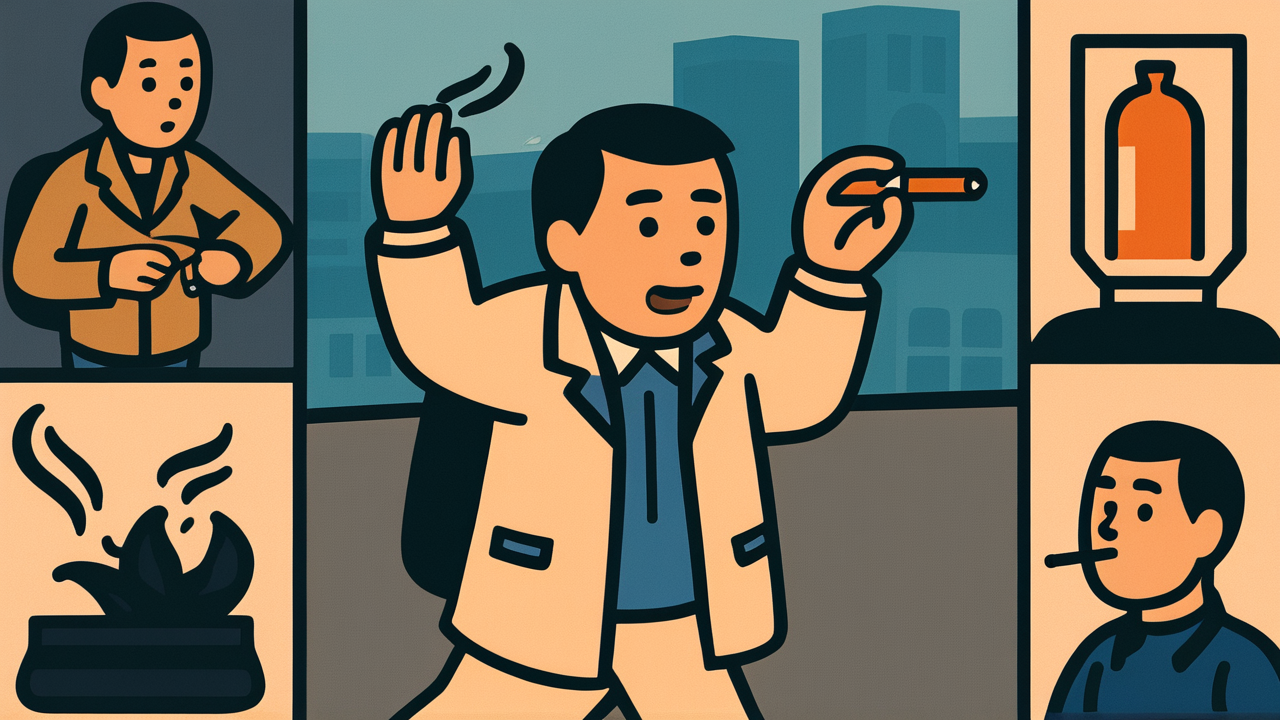How to Read “三遍回って煙草にしょ”
Sanben mawatte tabako ni sho
Meaning of “三遍回って煙草にしょ”
“Three times turn around tobacco let’s make” is a proverb that expresses the importance of organizing one’s feelings and preparing one’s mind before starting something.
Literally, it refers to the act of turning around three times before smoking tobacco, but its true meaning teaches us to pause once, calm our minds, and take preparation time to make that moment more valuable before doing something important or something we look forward to. In modern terms, it would be close to “taking a breath” or “taking a pause.”
This proverb is used when trying to rush through things, before making important decisions, or when teaching the proper mindset before enjoying something. Rather than simply wasting time, it conveys the value of setting aside time to “turn around three times” as a conscious preparation period to make subsequent actions more fulfilling. Even today, the same psychology works when we take deep breaths before important meetings or prepare our environment before listening to favorite music.
Origin and Etymology
The origin of “Three times turn around tobacco let’s make” is thought to have emerged as an expression rooted in the common people’s culture of the Edo period.
During this era, tobacco was a luxury item that was also beloved by common people as a favorite indulgence. By inserting the act of “turning around three times” before taking a smoke, there was likely a psychology at work trying to make the moment of smoking tobacco more special.
The expression “turning around three times” is also an element found in traditional Japanese ceremonies and etiquette. From shrine worship to sumo ring-entering ceremonies, performing rotating movements before important acts has been believed to have the effect of organizing one’s mind and switching one’s mood.
Also, in the townspeople’s culture of the Edo period, there was a custom of incorporating playfulness and sophistication even into trivial daily acts. Rather than simply smoking tobacco, by establishing one “ritual” beforehand, it’s presumed that the common people’s wisdom was embedded in trying to add small pleasures and changes to ordinary daily life.
Behind the establishment of this expression, there may have been the Japanese aesthetic sense of valuing time to take a breath even in busy daily life and consciously staging those moments.
Usage Examples
- Since it’s before an important business negotiation, let’s prepare ourselves with the spirit of Three times turn around tobacco let’s make
- Since it’s a precious holiday, with Three times turn around tobacco let’s make, shall we slowly brew some coffee?
Modern Interpretation
In modern society, the spirit of “Three times turn around tobacco let’s make” may hold even more important meaning than before. Precisely because we live in an era where digitalization has advanced and everything is processed instantaneously, the value of consciously creating “pauses” is being reconsidered.
In modern times when it has become normal to respond instantly to smartphone notifications and reply to emails in seconds, preparation time like “turning around three times” might seem inefficient. However, psychological research has also scientifically proven the effectiveness of taking a breath before important decisions.
The modern version of “Three times turn around tobacco let’s make” appears in reviewing content once before posting on social media, saving emails as drafts and letting time pass before sending important messages, and setting aside a few minutes of meditation time before online meetings.
Especially now that remote work has become widespread, the boundaries between work and private life tend to become ambiguous. In such times, by consciously establishing “switching rituals,” we can lead lives with proper balance. The time spent carefully brewing coffee or listening to one favorite song functions as modern “turning around three times” time.
This proverb quietly appeals to efficiency-focused modern society about the importance of sometimes stopping.
When AI Hears This
“Take three turns around and then have a smoke” represents remarkable evidence that Edo-period people had empirically discovered what modern neuroscience now explains as the mechanism of “walking-enhanced cognitive function.”
Stanford University research has proven that creative thinking improves by an average of 60% while walking compared to sitting. This occurs because walking rhythms stimulate the brain’s prefrontal cortex and promote connections between different neural circuits. The repetitive physical movement of “taking three turns” is precisely a behavioral pattern that maximizes this brain mechanism.
Even more fascinating is the psychological sophistication of setting tobacco as a “reward.” This applies the concept of “delayed gratification” from behavioral economics to enhance motivation for problem-solving. Since tobacco was an expensive luxury item at the time, using it as a reward naturally triggered dopamine release in the brain and built in a system that enhanced thinking concentration.
It’s no coincidence that many modern executives and researchers maintain the habit of “thinking while walking.” This wisdom created by Edo’s common people was an extremely scientific problem-solving method that integrated body rhythms, neuroscience, and behavioral psychology.
Lessons for Today
What “Three times turn around tobacco let’s make” teaches us today is the beauty of “pauses” in life. Precisely because we live in an era that demands efficient and quick processing of everything, it’s important to have the courage to consciously stop.
When you next face an important decision, instead of trying to immediately produce an answer, try taking a deep breath first. Before enjoying your favorite drink, create time to savor its aroma. Before conversations with family, try organizing the day’s events in your mind.
These small “rituals” might seem like wasted time at first glance. However, they possess magical power to transform the experiences that follow into something richer and more meaningful.
In modern society, we tend to feel that stopping is “falling behind.” But truly, preparation time is what gives depth and flavor to your life. The time spent turning around three times is never wasted. It is heartfelt respect for the wonderful moments about to begin.



Comments